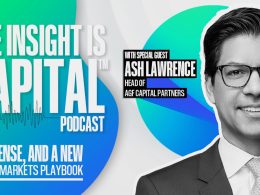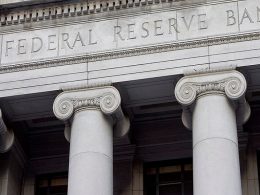by Bob Doll, Chief Equity Strategist, Fundamental Equities, BlackRock
 Risk assets (and equities in particular) powered to a strong week of gains, with the Dow Jones Industrial Average climbing 3.1% to 12,221, the S&P 500 Index advancing 2.7% to 1,314 and the Nasdaq Composite rising 3.8% to 2,743. Although a number of near-term risks remain (particularly related to the unpredictability of escalating unrest in the Middle East), we maintain our view that equity markets are likely to continue their long-term trend of outperformance.
Risk assets (and equities in particular) powered to a strong week of gains, with the Dow Jones Industrial Average climbing 3.1% to 12,221, the S&P 500 Index advancing 2.7% to 1,314 and the Nasdaq Composite rising 3.8% to 2,743. Although a number of near-term risks remain (particularly related to the unpredictability of escalating unrest in the Middle East), we maintain our view that equity markets are likely to continue their long-term trend of outperformance.
Before the earthquake in Japan and the widening turmoil in the Middle East and North Africa that occurred several weeks ago, economic growth in both the United States and the world was accelerating. We were seeing improvements in unemployment claims, manufacturing data, capital expenditures as well as in other leading indicators. It seemed as if the United States was in the process of transitioning to a self-sustaining expansion (although the housing market has remained stubbornly weak). The labor market as a whole still required some healing, but even that area of the economy was showing signs of improvement. Now the question many investors are asking is whether the events of the last few weeks will interrupt this transition.
The situation in Japan appears to be moderating, although the long-term impacts of the earthquake and resulting nuclear risks remain unknown. From our perspective, the escalating turmoil in the Middle East represents a more serious risk. The growing rebellion in Libya and the implementation of the no-fly zone have been generating the most headlines, but as we have been saying in recent commentaries, we are focusing our attention on Saudi Arabia. The movement of Saudi military forces into Bahrain certainly represents a new dynamic and widening of the geopolitical risks in the broader region, but as of now, unrest in Saudi Arabia itself remains contained.
Given Saudi Arabia’s prominence in the global oil trade, political unrest in the country would have the potential to trigger an additional major spike in oil prices. Oil prices have already jumped higher over the past several weeks and appear to have a risk premium of somewhere around $20 a barrel already built into the current price. A major disruption in actual supplies in Saudi Arabia (or elsewhere) could push oil prices back to their record levels of around $150 a barrel. If oil prices reached that level and remained there for some time, it would certainly represent a serious threat to global economic growth, but this is a hypothetical situation that we believe is unlikely to play out. Given this backdrop, our answer to the question raised above is no, the short-term risks are unlikely to derail the economic recovery. Monetary and fiscal support remains conducive to stronger growth levels, and despite concerns to the contrary, we are not expecting inflation risks to rise at any point soon.
With last week’s rally, and the benefit of hindsight, it looks to us like the recent selloff was more a matter of risk aversion, hedging and position covering than it was an actual shift in broader investor sentiment from bullish to bearish. From the intraday peak to trough, stocks fell around 7% (with the S&P 500 hitting a low of 1,250) and have since recovered 5% of their value. We would caution that this rebound may be temporary, that the corrective period may not yet be over and that future gains may be more uneven than they were toward the end of last year and early in 2011. Nevertheless, we continue to believe that stocks (and US stocks in particular) should remain a preferred asset class.
About Bob Doll
Bob Doll is Chief Equity Strategist for Fundamental Equities at BlackRock® a premier provider of global investment management, risk management and advisory services. Mr. Doll is also Lead Portfolio Manager of BlackRock's Large Cap Series Funds. Prior to joining the firm, Mr. Doll was President and Chief Investment Officer at Merrill Lynch Investment Managers.
Sources: BlackRock; Bank Credit Analyst. This material is not intended to be relied upon as a forecast, research or investment advice, and is not a recommendation, offer or solicitation to buy or sell any securities or to adopt any investment strategy. The opinions expressed are as of March 28, 2011, and may change as subsequent conditions vary. The information and opinions contained in this material are derived from proprietary and nonproprietary sources deemed by BlackRock to be reliable, are not necessarily all-inclusive and are not guaranteed as to accuracy. Past performance is no guarantee of future results. There is no guarantee that any forecasts made will come to pass. Reliance upon information in this material is at the sole discretion of the reader. Investment involves risks. International investing involves additional risks, including risks related to foreign currency, limited liquidity, less government regulation and the possibility of substantial volatility due to adverse political, economic or other developments. The two main risks related to fixed income investing are interest rate risk and credit risk. Typically, when interest rates rise, there is a corresponding decline in the market value of bonds. Credit risk refers to the possibility that the issuer of the bond will not be able to make principal and interest payments. Index performance is shown for illustrative purposes only. You cannot invest directly in an index.
Copyright © BlackRock












